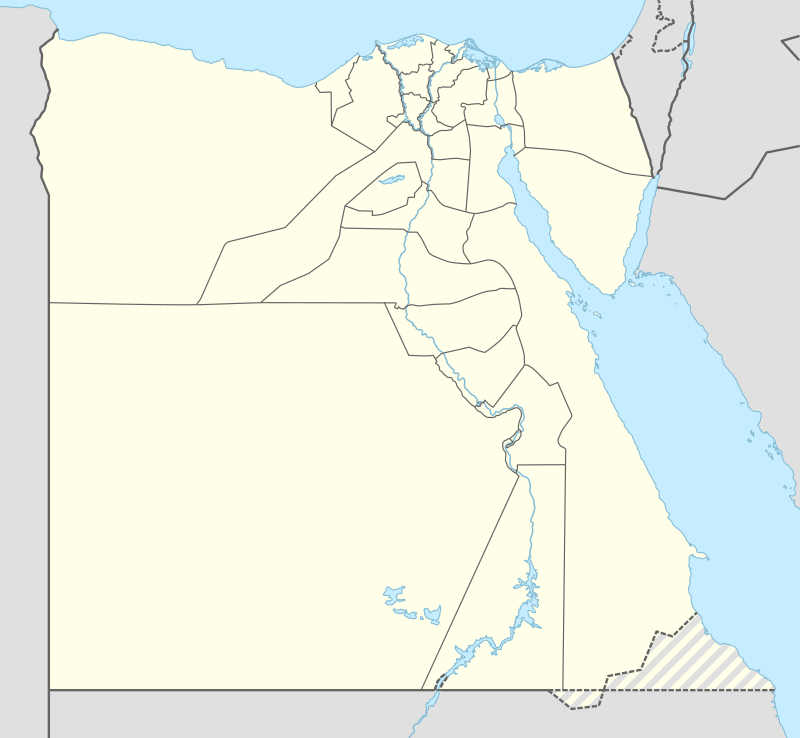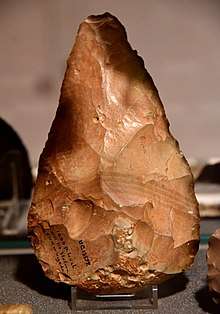Naqada
Naqada (Arabic: نقادة, Naqāda, Coptic: ⲛⲉⲕⲁⲧⲏⲣⲓⲟⲛ Nekatērion[1]) is a town on the west bank of the Nile in Qena Governorate, Egypt. It includes the villages of Tukh, Khatara, Danfiq, and Zawayda. The town is one of few to have had a Coptic majority in 1960[2] and preserved the Coptic language up until 1950s[3].
Naqada | |
|---|---|
 Naqada Location in Egypt | |
| Coordinates: 25°54′N 32°43′E | |
| Country | |
| Governorate | Qena Governorate |
| Time zone | UTC+2 (EST) |
| • Summer (DST) | +3 |
History and archeology
Naqada stands near the site of a prehistoric Egyptian necropolis: The town was the centre of the cult of Set and large tombs were built there c. 3500 BCE.[4]
The large quantity of remains from Naqada have enabled the dating of the entire archeological period throughout Egypt and environs, hence the town name Naqada is used for the pre-dynastic Naqada culture c. 4400–3000 BCE. Other Naqada culture archeological sites include el Badari, the Gerzeh culture, and Nekhen.
- Sickle made of flint, Egypt, Naqada period, end of the fourth millennium BCE, Dagon Museum, Haifa
 Acheulean hand-axe from Egypt. Found on a hill top plateau, 1400 feet above sea level, 9 miles NNW of the city of Naqada, Egypt. Paleolithic. The Petrie Museum of Egyptian Archaeology, London
Acheulean hand-axe from Egypt. Found on a hill top plateau, 1400 feet above sea level, 9 miles NNW of the city of Naqada, Egypt. Paleolithic. The Petrie Museum of Egyptian Archaeology, London_II_on_right_arm._From_the_temple_of_Seth_at_Naqqada%2C_Egypt._The_Petrie_Museum_of_Egyptian_Archaeology%2C_London.jpg) Black granite, seated statue of Sennefer with cartouche of Amenhotep II (Amenophis) on right arm. From the temple of Seth at Naqada, Egypt. The Petrie Museum of Egyptian Archaeology, London
Black granite, seated statue of Sennefer with cartouche of Amenhotep II (Amenophis) on right arm. From the temple of Seth at Naqada, Egypt. The Petrie Museum of Egyptian Archaeology, London
See also
References
- EMILE MAHER ISHAK. THE PHONETICS AND PHONOLOGY OF THE BOHAIRIC DIALECT OF COPTIC AND THE SURVIVAL OF COPTIC WORDS IN THE COLLOQUIAL AND CLASSICAL ARABIC OF EGYPT AND OF COPTIC GRAMMATICAL CONSTRUCTIONS IN COLLOQUIAL EGYPTIAN ARABIC.
- "Discrepancies between Coptic statistics" (PDF).
- W. H. Worrell (1937). "Popular Traditions of the Coptic Language" (The American Journal of Semitic Languages and Literatures ed.). Cite journal requires
|journal=(help)CS1 maint: date and year (link) - Rice, Michael (2003). Egypt's Making: The origins of ancient Egypt 5000–2000 BC. Taylor & Francis. p. 75. ISBN 978-0-203-42816-0 – via Google Books.
| Wikimedia Commons has media related to Naqada. |